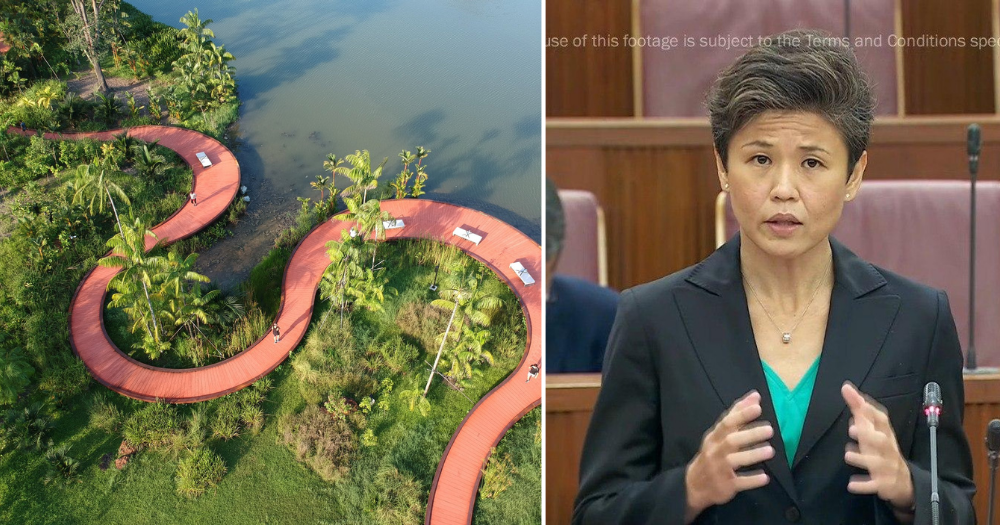Follow us on Telegram for the latest updates: https://t.me/mothershipsg
As part of a motion to address climate change, decarbonisation and transitioning workers to green jobs and industries were major topics covered in Parliament on Jan. 12.
The private member's motion was fronted by PAP Member of Parliament (MP) Poh Li San.
Singapore is hurtling towards transitioning to a green economy, but it is important to ensure that this is a whole-of-country effort, involving the government, civil society groups, and the community, Poh said.
Poh, who is also the Deputy Chair of the Government Parliamentary Committee (GPC) for Sustainability and the Environment, added that the move is akin to a "fast-paced mass marathon".
The government is racing against time to mitigate a climate emergency, but yet, there is also the need to sustain this green transition in the long term.
Calls on the government to create more green jobs and strengthen corporate accountability
This second motion states:
"This House calls for the Government to enhance green financing, create more green jobs, and strengthen corporate accountability, in partnership with the private sector, civil society and community, to advance Singapore’s inclusive transition towards a low-carbon society."
At least 15 People's Action Party (PAP) Members of Parliament (MPs), Workers' Party MPs Gerald Giam, He Ting Ru and Dennis Tan, as well as Nominated MP Koh Lian Pin, a conservation scientist, spoke during the debate.
Singapore can contribute to global efforts
Poh took some time to recap some facts surrounding Singapore's current position in the climate crisis.
Although Singapore contributes "only" about 0.1 per cent to global carbon emissions, Poh believes it is important for the country to chip in to global efforts mitigating climate change and reduce our carbon footprint.
Singapore can do so by being an "enabler, intermediary and facilitator", and by serving as a green finance hub and carbon trading centre to help reduce emissions even outside our borders.
Helping businesses
A priority is to ensure that Singaporeans are not left behind amidst the progression to a sustainable future.
Going green entails its own costs, and businesses need help to "get ahead of the curve in sustainability", Poh said.
As such, the government needs to strike a fine balance between environmental sustainability and economic sustainability to maintain this transition for the long haul.
Poh suggested avoiding too onerous targets that might push businesses to relocate to other jurisdictions, and to set up different timeframes for different types of businesses to transition.
She also noted that trade-offs need to be made to meet Singapore's national emissions commitment — "for reasons of national strategic interests", some critical activities need to be continued despite generating a large amount of emissions.
Working with our neighbours
Considering Singapore faces constraints for the production of renewable energy, Poh suggested working with neighbouring countries who have more abundant renewable energy resources, to pool financing and engineering expertise to mitigate climate change.
The government is already importing renewable energy from Malaysia, Indonesia and Australia, and there are plans for Singapore to import 30 per cent of its electricity from low-carbon sources by 2035.
Training workers for green jobs
Singaporeans need to be equipped with the right skills in order to take advantage of opportunities in the sustainability sector.
The inaugural Skills Demand for the Future Economy report has identified more than 450 green job roles across 17 sectors, Poh revealed.
To prepare and train Singaporeans to take up such roles, new curriculum, syllabuses and courses need to be drawn up at ITEs, polytechnics, and Institutes of Higher Learning "in a timely manner to meet industry needs".
Poh recommended that institutions can consider integrating green projects into modules to equip students with the relevant sustainability-related skills, as well as arranging for internships and apprenticeships in these sectors.
Additionally, the proposed Green Space Academy is one way to bolster this transition — it will groom local experts in research and development to sustain a pipeline of well-trained and specialised talents.
Not forgetting older workers in sunset industries, Poh urged Enterprise Singapore and SkillsFuture Singapore to work closely with labour unions to equip these senior workers with relevant skills to enter the green sector.
Related stories
Top photo from NParks / FB
If you like what you read, follow us on Facebook, Instagram, Twitter and Telegram to get the latest updates.

